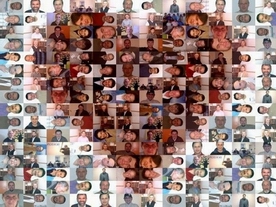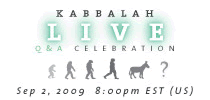
In the beginning, humanity thrived and prospered in common love.
Over the generations, human evolution, fueled by growing egoism, destroyed the common love and brought about exile from this perfect state.
Today, as human egoism intensifies, humanity finds itself at a crucial junction: we need love for one another like air.
In order to achieve the state of common love that humanity experienced eons ago, the great Kabbalists adapted the wisdom of Kabbalah – the method that teaches how to reach common love – to our generation.
The growing need to reinstate the love among us is the reason for the current emergence of the wisdom of Kabbalah among the masses.
When we reach out our hands to one another and unite, we will be on the highway to another life –
one of love, perfection, and eternity.
To make this happen, we only need to want it.
Kabbalah stems down in a new language today, one suiting itself more and more to the people’s needs, since the need to feel love is growing. The main messages of Kabbalah are emerging in popular verbal, pictorial, and media forms today, so that everyone has a chance to bond in the common love between us.
![]() Click Here to Get the New PDF “Kabbalah on Love” featuring Q&A from Michael Laitman’s Personal Blog
Click Here to Get the New PDF “Kabbalah on Love” featuring Q&A from Michael Laitman’s Personal Blog

Kabbalah LIVE Video Q&A Celebration
Wednesday, September 02.09 – 8:00pm EST (U.S.)

Definitions of Love
True Love
True love exists only when a person’s love is so great that he or she feels the others’ needs and cravings as if they were one’s own. When a person rises to such a spiritual degree, one feels the real and most complete concept of love.
Unconditional Love
When one loves another without wanting any personal benefit in return, this is considered “unconditional love.” It is a very high spiritual degree, and the way to reach it is through studying authentic Kabbalah books. During the study, a person awakens upon oneself the impact of the Upper Light, and gradually steps on the path that leads to the sensation of love that is not dependent on anything.
A Web of Love
In our world, we know couples that live well together, “like love birds.” But in spirituality there is no specific pair of souls that were made for one another. Rather, all souls are made to bond with one another in a bonding of true love. When they do that, they will discover the Upper Force among them, the force of love and of giving.
Egoistic Love
Many people love fish. But they love to eat them, not romantically. Egoistic love is like love of fish. It is the sensation of pleasure and satisfaction that one derives from the exploitation of another.
Motherly Love
Unlike love of fish, the love of a mother for her children is natural love. The mother perceives her child as an inseparable part of her, and the child becomes more important to her than her own life. Hence, the mother naturally does all she can to satisfy the needs of her offspring, and places them above her own needs. When her child is happy, she is overjoyed with satisfaction.
Love Out Of Fear
Our love is always connected with fear that we might lose it. According to Kabbalah, there are two kinds of fear: corporeal fear and spiritual fear.
In our world, a person is always concerned about being loved by others. One is afraid that without their love, he or she might be hurt. In spirituality, however, the individual loves others without any intent for self-benefit, and one’s only fear is that one’s love will diminish or even stop.
Measured Love
To rise to spirituality, we must come to love others in the exact same measure that we love ourselves. But how do we know the measure and the form in which we have to love others? We are born with a nature of self-love so that we can learn how much we love ourselves, and thus know how much and in what way we have to love others.
Love for Humanity
A person who progresses on the spiritual path and learns from Kabbalah books develops a powerful internal desire to bring the whole nation to a state of unity and love. This was the hope of all the great Kabbalists, and this is what they worked for.
![]() Click Here to Get the New PDF “Kabbalah on Love” featuring Q&A from Michael Laitman’s Personal Blog
Click Here to Get the New PDF “Kabbalah on Love” featuring Q&A from Michael Laitman’s Personal Blog

Greetings!
I enjoyed reading your blog and would like to share with you a project World Unity, Inc. has been dedicated to for the past 19 years that supports your values and concept of love for humanity. I hope you will take a moment to check out the website of World Unity, Inc. http://www.worldunityinc.org and share it with your community.
Thanks for your time and attention. Have a blessed day.
Sara